Debunking Power Tool Battery Compatibility Myths
It’s a question that comes up a lot, so let’s get to it immediately.
Can OEM power tool batteries be replaced with batteries from third-party component suppliers? The answer is a definitive “no.”
Why not? Because each original equipment manufacturer (OEM) has a proprietary control circuitry for the total system, which encompasses the tool, battery and charger. This is so the three components communicate properly. There are numerous design considerations manufacturers address in the construction of their batteries: type and quality of cells, durability of electrical connections, electronic controls (in the battery, charger and tool), protective housing, compliance with standards and third-party certification, etc.
And the key here? The inner workings of each system are proprietary. The same circuitry designs are not available to third-party component suppliers. That’s why those batteries, often called counterfeits or knock-offs, are more than just a gamble on performance — they’re a safety risk.
So, if someone is looking for power tool battery cross-compatibility outside of an OEM’s system, it’s a myth.
This is a myth professional safety and risk managers know all too well. These professionals are responsible for the protection of businesses and their employees from dangerous consequences that can result from well-meaning penny watchers who might think short-term savings can trump safety. That’s never the case. But without these professional overseers that businesses employ, consumers and smaller or independent contractors dangerously continue to show a casual disregard for battery safety.
And the market for cheaper knock-offs keeps growing. In recent years, a new type of power tool accessory called an adapter has emerged. These adapters claim to allow power tool battery packs from one manufacturer to be used with another manufacturer’s power tools. They are especially popular on online marketplaces where performance and authenticity are difficult to verify.
While adapters might seem like handy devices, they can cause potentially dangerous consequences including overheating and even fires.
So, what are the consequences of choosing cheap counterfeits or knock-offs or looking to sidestep the tool’s designed parameters by using adapters? At best, users run the risk of poor performance and shorter battery life or damage to the tool. The battery can also overheat, causing complete failure. Even worse, the battery might burst, causing a fire or explosion that could result in personal injury and/or property damage. Batteries can also catch fire on the charger when cell temperatures aren’t being properly monitored and managed.
For these reasons, all power tool manufacturers recommend that only OEM batteries be used.
Now, sometimes there is power tool battery cross-compatibility, but only between tools made by the same OEM. If there’s a power tool brand you prefer, read the owner’s manual again to see if the OEM battery for one tool can be used with another type of tool from the same manufacturer. This is the only way to achieve true, safe cross-compatibility. But remember, if the manufacturer doesn’t clearly state that its batteries are compatible between tool types, assume they are not and do not attempt it.
For all these safety and compliance considerations, batteries are not cross-compatible (unless specified by the power tool manufacturer).



